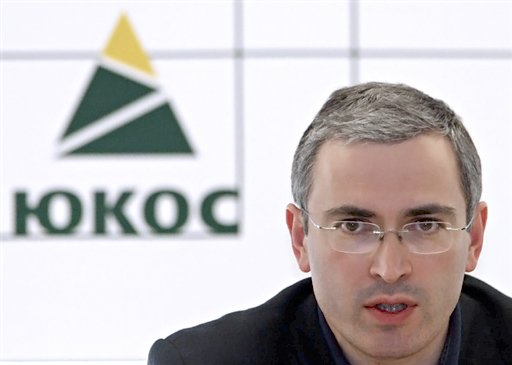Russia ordered to pay $50 billion in damages in Yukos bankruptcy case
Russia will appeal a Hague court decision ordering it to pay $50 billion in damages Yukos Oil Co. case, the biggest compensation package ordered to date.
Russia was told to pay the money to former shareholders in the now defunct oil producer Yukos.
The Hague court said Russian officials had manipulated the legal system to bankrupt Yukos, and jail its boss.
The Russian finance ministry said the ruling was “flawed”, “one-sided” and “politically biased.”
The ministry added that the Hague’s arbitration court “had no jurisdiction to consider the questions it was given”.
The claim was filed by a subsidiary for the financial holding company GML, once the biggest shareholder in Yukos Oil Co.
GML Executive Director Tim Osborne said: “The majority shareholders of Yukos Oil were left without compensation for the loss of their investment when Russia illegally expropriated Yukos.”
“It is a major step forward for the majority shareholders, who have been battling for over 10 years for this decision.”
However, in a statement, the Russian ministry said: “Because of substantial shortcomings in the rulings of the arbitration court, the Russian Federation will challenge the rulings of the arbitration court in Dutch courts and expects to obtain a fair result there.”

Mikhail Khodorkovsky built Yukos into Russia’s largest investor-owned oil company after the fall of the Soviet Union
GML’s lawyer Emmanuel Gaillard said: “This is an historic award. It is now judicially established that the Russian Federation’s actions were not a legitimate exercise in tax collection but, rather, were aimed at destroying Yukos and illegally expropriating its assets for the benefit of State instrumentalities Rosneft and Gazprom.”
Dr. Florian Otto from risk advisory company Maplecroft said that Russia will be hoping to win time and reduce publicity.
He said: “For Russia, paying the money is out of the question, as this could be construed as an acknowledgement that the seizing of Yukos’ assets was illegal – a viewpoint the Kremlin will never accept.
“The ruling does not come as a surprise to any of the parties involved, but the coincidental timing with the downing of flight MH17 certainly adds to the pressure Russia is currently exposed to.
“The case serves as a fresh reminder of state interference in business at a time when business confidence is already at a low point.”
Lawyers said that if Russia does not voluntarily accept the ruling, it can be forcibly enforced by shareholders seizing assets abroad.
Konstantin Lukoyanov of global law firm Linklaters said: “If it is accepted, it can be carried out voluntarily, or it will be implemented forcibly.
“In that case the seizure of assets abroad is possible. There have been several similar cases.”
Leonid Nevzlin, former deputy chairman of Yukos told a Moscow radio station: “I think shareholders are ready for the next stage, if Russia refuses to pay them, to search for and seize Russian assets all around the world.”
Yukos was disbanded in 2007 after filing for bankruptcy in 2006.
The company was formerly controlled by Mikhail Khodorkovsky, who was at one point Russia’s richest man.
Responding to the news, Mikhail Khordorkovsky said it was “fantastic” that shareholders were “being given chance to recover assets”.
Mikhail Khodorkovsky built Yukos into Russia’s largest investor-owned oil company after the fall of the Soviet Union.
He was arrested in 2003 and spent ten years in jail after being convicted of fraud and tax evasion but was pardoned last December.
The state-owned Rosneft bought the bulk of Yukos assets though auctions after the company, once the country’s largest oil producer, was declared bankrupt. Rosneft says all the deals were legal.
[youtube Z3d96g_L7Ac 650]

